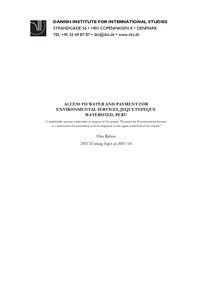Location
DIIS is an independent research institution for international studies, financed primarily by the Danish state. We conduct and communicate multidisciplinary research on globalisation, security, development and foreign policy and within these areas we aim to be agenda-setting in research, policy and public debate. DIIS participates in academic networks and publish in high-ranking academic journals, always striving to excel in academic scholarship. We continuously assess Denmark's foreign and political situation and inform the Danish media, politicians and the public about our work.
Members:
Resources
Displaying 16 - 20 of 25Pobreza agua y tierra en Ambato Ecuador: Perfil de pobreza y el accesso y manejo de agua y tierra en la cuenca de Ambato
Access to water and payment for environmental services: Jequetepeque watershed Peru
Land Rights and Land Conflicts in Africa: The Tanzania Case
Issues identified as being of major importance in relation to the land rights and land conflict situation are: questions related to governance; contradictions and lack of harmonisation between recent laws and policies in Tanzania; the existing power relations (including gender relations); and present development priorities. Makes it clear that dealing with land matters is in essence political and presents a series of recommendations for interventions in the field of land rights.
Land Rights and Land Conflicts in Africa: The Benin Case
The report discusses the approach and methods underlying the study and offers conceptual clarifications. It presents the legal framework and historical context in relation to political economy and identity politics. The bulk of the report is devoted to the analysis of significant case studies: on boundary conflicts linked to decentralisation and development programmes, the conservation issue, autochthons/migrants relations, the ‘youth factor’. A final section outlines policy orientations.
Struggles of Access to land. The 'Squatter Question' in Coastal Kenya
In Kenya and the sub-Saharan Africa generally, there have been little systematic discussions on the post-colonial struggles over control and ownership of land. Studies ignore that the "land question" is not about production alone and consequently have failed to assess its wider consequences on the society.





